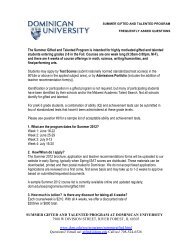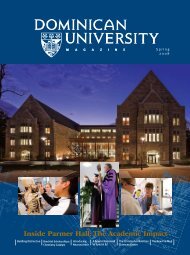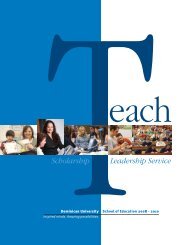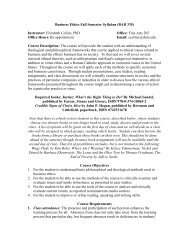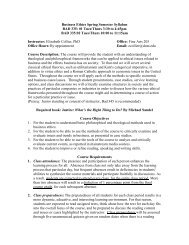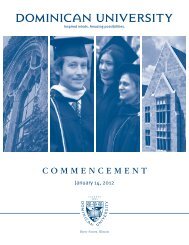6 2 - Dominican University
6 2 - Dominican University
6 2 - Dominican University
You also want an ePaper? Increase the reach of your titles
YUMPU automatically turns print PDFs into web optimized ePapers that Google loves.
INTEGRATIVE SEMINARS – CRITICAL THINKING IN THE REAL WORLD<br />
For the past 30+ years, <strong>Dominican</strong>’s liberal arts and science seminars<br />
have been a central component of the university’s core curriculum,<br />
offering students opportunities to apply multiple perspectives to the<br />
“big” questions and integrate these perspectives into their learning<br />
and life experiences.<br />
“The seminars prepare students for real-world thinking about topics<br />
that require a variety of approaches and areas of knowledge,” says<br />
Jeffrey Carlson, PhD, dean, Rosary College of Arts and Science.<br />
“The seminars are the vertical spine of our liberal arts and sciences<br />
education, and they allow students to connect their majors with the<br />
core curriculum during all four years at <strong>Dominican</strong>.”<br />
While many schools offer similar courses and seminars as part of their<br />
curriculum, <strong>Dominican</strong> is relatively distinctive in requiring students to<br />
take seminar courses each year through to graduation. “Seminars help<br />
our students think multidimensionally. They are interesting and<br />
frustrating because just like in the real world, these big questions don’t<br />
have immediate answers,” says William George, PhD, director of the<br />
core curriculum and professor of theology. “It is a significant<br />
undertaking and commitment and many schools are amazed that we<br />
are able to provide such a comprehensive and rich seminar program.”<br />
Modeled in part on the yearly seminars that were a central component<br />
of the Rosary College Honors Program, the seminars evolved and<br />
expanded in breadth and depth, ultimately being integrated into the<br />
undergraduate’s core curriculum some 20 years ago.<br />
sem<br />
a r<br />
Accreditation by third-party organizations is a demonstration<br />
that the university meets acceptable levels of quality and<br />
competence, and that it meets the highest standards of<br />
achievement. Accreditation is a voluntary process and <strong>Dominican</strong><br />
<strong>University</strong> holds accreditations from the following organizations:<br />
• The North Central Association of Colleges and Secondary Schools<br />
as a baccalaureate and master’s degree-granting institution.<br />
• The American Library Association for the Master of Library and<br />
Information Science program.<br />
• The Association of Collegiate Business Schools and Programs<br />
for the accounting and business administration programs in<br />
the Brennan School of Business.<br />
Seminars bring students and faculty together to collaborate in<br />
a distinctive way, George says, and this collaboration allows<br />
students and teachers to explore big questions and real-world<br />
problems from different perspectives and drawing on a range of<br />
academic disciplines.<br />
“Seminars allow students and teachers from all different backgrounds<br />
to bring their views, experiences and opinions to the table,” says George.<br />
“These kinds of questions and problems are rarely resolved without<br />
the contribution of several disciplines and various points of view.”<br />
The courses follow specific themes by class – Freshman: Dimensions<br />
of the Self; Sophomore: Community, Culture and Diversity; Junior:<br />
Technology, Work and Leisure; and Senior: Virtues and Values. Within<br />
each seminar series are numerous courses that students can choose<br />
from with titles as intriguing as “Facebook: Images of the Self as<br />
Friend,” “I Am My iPod,” “Lifesizing in an Era of Downsizing,<br />
Digitalizing and Fantasizing” and “Myths that Shape Our Lives.”<br />
“Seminars are the classes that make sense of all the other classes,”<br />
Carlson says. “They are practice sessions for the rest of our students’<br />
lives, as they think and live in relation to critical issues and questions,<br />
not merely as well-trained specialists in this or that narrow area,<br />
but as educated persons with an informed and ethically responsible<br />
personal stance.”<br />
“Education is a life-long learning experience,” George says,<br />
“and we are preparing students for life.”<br />
• The Commission on Accreditation of the Council on Social Work<br />
Education for the Graduate School of Social Work.<br />
• The Illinois State Board of Education.<br />
FEATURE<br />
ditation<br />
DOMINICAN ACCREDITATIONS – MEETING THE HIGHEST STANDARDS OF QUALITY<br />
• The Illinois Department of Registration and Education, and the State<br />
Approving Agency for Veterans Affairs.<br />
• The program in nutrition and dietetics has development accreditation<br />
from the Commission on Accreditation for Dietetics Education.<br />
<strong>Dominican</strong> <strong>University</strong> is in the process of seeking accreditation from the<br />
National Council for Accreditation of Teacher Education (NCATE) and the<br />
Association to Advance Collegiate Schools of Business (AACSB).<br />
Fall 2010 <strong>Dominican</strong> <strong>University</strong> Magazine<br />
9



